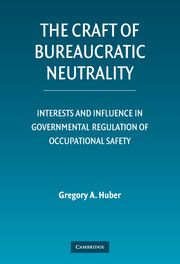 The Craft of Bureaucratic Neutrality
The Craft of Bureaucratic Neutrality Published online by Cambridge University Press: 27 July 2009
The primary empirical focus of this book is federal and state enforcement of the Occupational Safety and Health Act of 1970 (OSH Act). The OSH Act sets out as its purpose “[t]o assure safe and healthful working conditions for working men and women,” and to attain this goal it authorizes the promulgation and enforcement of rules for employers governing working conditions. The enforcement of these rules is the shared responsibility of a federal agency, the Occupational Safety and Health Administration (OSHA), and the states. After introducing this case, this chapter tests the claim that bureaucratic leaders can often respond to both external political pressure and the need to control their subordinates by adopting a “strategically neutral” enforcement posture. This examination therefore links this specific inquiry with my more general interest in assessing the theories of bureaucratic power and decision making introduced in the previous chapter.
OSHA's embrace of strategic neutrality has allowed the agency's leaders to direct policy, to a substantial degree, toward their own ends despite opposition to aggressive government regulation of working conditions. By systemically discriminating among businesses based on their size, safety history, and industry of operation, OSHA has demobilized specific components of the business lobby, particularly small businesses in safe industries, that would otherwise incline politicians to act against the agency. At the same time, by persistently enforcing the law neutrally across geographic areas and individual firms, OSHA has assured supporters that it is necessary and effective.
To save this book to your Kindle, first ensure no-reply@cambridge.org is added to your Approved Personal Document E-mail List under your Personal Document Settings on the Manage Your Content and Devices page of your Amazon account. Then enter the ‘name’ part of your Kindle email address below. Find out more about saving to your Kindle.
Note you can select to save to either the @free.kindle.com or @kindle.com variations. ‘@free.kindle.com’ emails are free but can only be saved to your device when it is connected to wi-fi. ‘@kindle.com’ emails can be delivered even when you are not connected to wi-fi, but note that service fees apply.
Find out more about the Kindle Personal Document Service.
To save content items to your account, please confirm that you agree to abide by our usage policies. If this is the first time you use this feature, you will be asked to authorise Cambridge Core to connect with your account. Find out more about saving content to Dropbox.
To save content items to your account, please confirm that you agree to abide by our usage policies. If this is the first time you use this feature, you will be asked to authorise Cambridge Core to connect with your account. Find out more about saving content to Google Drive.